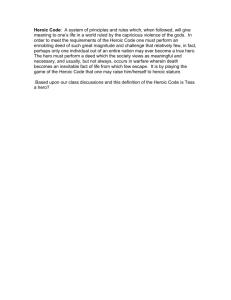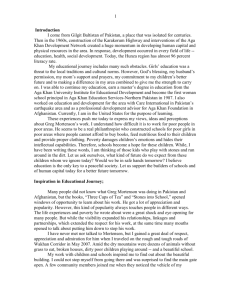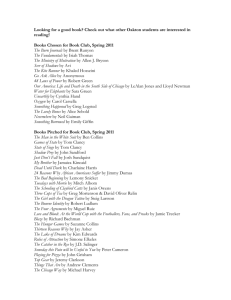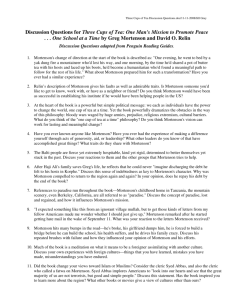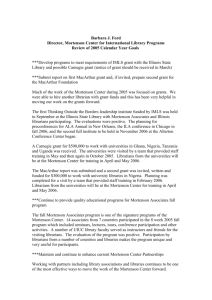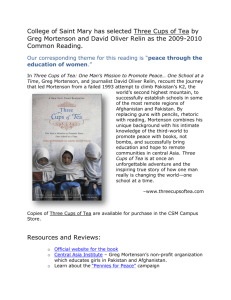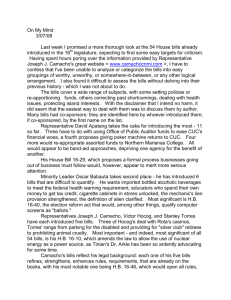For One More Day – Mitch Albom
advertisement
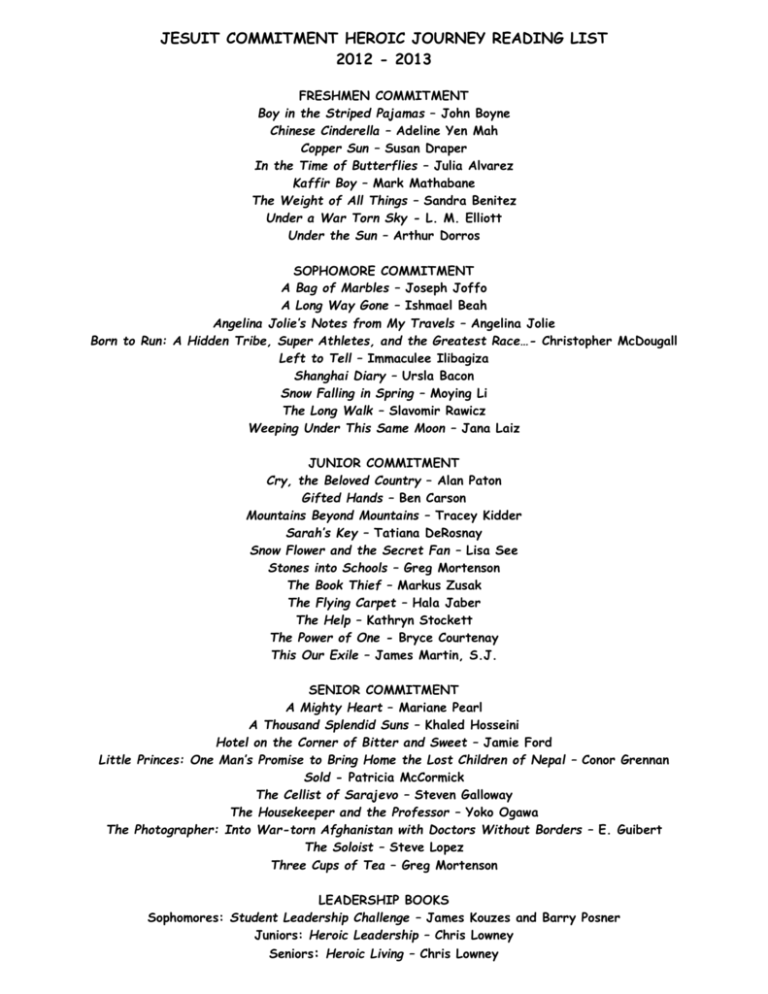
JESUIT COMMITMENT HEROIC JOURNEY READING LIST 2012 - 2013 FRESHMEN COMMITMENT Boy in the Striped Pajamas – John Boyne Chinese Cinderella – Adeline Yen Mah Copper Sun – Susan Draper In the Time of Butterflies – Julia Alvarez Kaffir Boy – Mark Mathabane The Weight of All Things – Sandra Benitez Under a War Torn Sky - L. M. Elliott Under the Sun – Arthur Dorros SOPHOMORE COMMITMENT A Bag of Marbles – Joseph Joffo A Long Way Gone – Ishmael Beah Angelina Jolie’s Notes from My Travels – Angelina Jolie Born to Run: A Hidden Tribe, Super Athletes, and the Greatest Race…- Christopher McDougall Left to Tell – Immaculee Ilibagiza Shanghai Diary – Ursla Bacon Snow Falling in Spring – Moying Li The Long Walk – Slavomir Rawicz Weeping Under This Same Moon – Jana Laiz JUNIOR COMMITMENT Cry, the Beloved Country – Alan Paton Gifted Hands – Ben Carson Mountains Beyond Mountains – Tracey Kidder Sarah’s Key – Tatiana DeRosnay Snow Flower and the Secret Fan – Lisa See Stones into Schools – Greg Mortenson The Book Thief – Markus Zusak The Flying Carpet – Hala Jaber The Help – Kathryn Stockett The Power of One - Bryce Courtenay This Our Exile – James Martin, S.J. SENIOR COMMITMENT A Mighty Heart – Mariane Pearl A Thousand Splendid Suns – Khaled Hosseini Hotel on the Corner of Bitter and Sweet – Jamie Ford Little Princes: One Man’s Promise to Bring Home the Lost Children of Nepal – Conor Grennan Sold - Patricia McCormick The Cellist of Sarajevo – Steven Galloway The Housekeeper and the Professor – Yoko Ogawa The Photographer: Into War-torn Afghanistan with Doctors Without Borders – E. Guibert The Soloist – Steve Lopez Three Cups of Tea – Greg Mortenson LEADERSHIP BOOKS Sophomores: Student Leadership Challenge – James Kouzes and Barry Posner Juniors: Heroic Leadership – Chris Lowney Seniors: Heroic Living – Chris Lowney FRESHMEN COMMITMENT LIST Boy in the Striped Pajamas – John Boyne Boyne has written a sort of historical allegory–a spare, but vividly descriptive tale that clearly elucidates the atmosphere in Nazi Germany during the early 1940s that enabled the persecution of Eastern European Jews. Through the eyes of Bruno, a naive nine-year-old is raised in a privileged household by strict parents whose expectations included good manners and unquestioning respect for parental authority, the author describes a visit from the Fury and the family’s sudden move from Berlin to a place called Out-With in Poland. There, not 50 feet away, a high wire fence surrounds a huge dirt area of low huts and large square buildings. From his bedroom window, Bruno can see hundreds (maybe thousands) of people wearing striped pajamas and caps, and something made him feel very cold and unsafe. Uncertain of what his father actually does for a living, the boy is eager to discover the secret of the people on the other side. He follows the fence into the distance, where he meets Shmuel, a skinny, sad-looking Jewish resident who, amazingly, has his same birth date. Bruno shares his thoughts and feelings with Shmuel, some of his food, and his final day at Out-With, knowing instinctively that his father must never learn about this friendship. While only hinting at violence, blind hatred, and deplorable conditions, Boyne has included pointed examples of bullying and fearfulness. His combination of strong characterization and simple, honest narrative make this powerful and memorable tale a unique addition to Holocaust literature for those who already have some knowledge of Hitler’s Final Solution.–Susan Scheps Chinese Cinderella – Adeline Yen Mah Chinese Cinderella is the perfect title for Adeline Yen Mah's compelling autobiography in which, like the fairy-tale maiden, her childhood was ruled by a cruel stepmother. "Fifth Younger Sister" or "Wu Mei," as Yen Mah was called, is only an infant when her father remarries after her mother's death. As the youngest of her five siblings, Wu Mei suffers the worst at the hands of her stepmother Niang. She is denied carfare, frequently forgotten at school at the end of the day, and whipped for daring to attend a classmate's birthday party against Niang's wishes. Her father even forgets the spelling of her name when filling out her school enrollment record. In her loneliness, Wu Mei turns to books for company: "I was alone with my beloved books. What bliss! To be left in peace with Cordelia, Regan, Gonoril, and Lear himself--characters more real than my family... What happiness! What comfort!" Even though Wu Mei is repeatedly moved up to grades above those of her peers, it is only when she wins an international play-writing contest in high school that her father finally takes notice and grants her wish to attend college in England. Despite her parent's heartbreaking neglect, she eventually becomes a doctor and realizes her dream of being a writer. Teens, with their passionate convictions and strong sense of fair play, will be immediately enveloped in the gross injustice of Adeline Yen Mah's story. A complete glossary, historical notes on the state of Chinese society and politics during Yen Mah's childhood, and the legend of the original Chinese Cinderella round out this stirring testimony to the strength of human character and the power of education. Copper Sun – Sharon Draper This action-packed, multifaceted, character-rich story describes the shocking realities of the slave trade and plantation life while portraying the perseverance, resourcefulness, and triumph of the human spirit. Amari is a 15-year-old Ashanti girl who is happily anticipating her marriage to Besa. Then, slavers arrive in her village, slaughter her family, and shatter her world. Shackled, frightened, and despondent, she is led to the Cape Coast where she is branded and forced onto a boat of death for the infamous Middle Passage to the Carolinas. There, Percival Derby buys her as a gift for his son's 16th birthday. Trust and friendship develop between Amari and Polly, a white indentured servant, and when their mistress gives birth to a black baby, the teens try to cover up Mrs. Derby's transgression. However, Mr. Derby's brutal fury spurs them to escape toward the rumored freedom of Fort Mose, a Spanish colony in Florida. Although the narrative focuses alternately on Amari and Polly, the story is primarily Amari's, and her pain, hope, and determination are acute. Cruel white stereotypes abound except for the plantation's mistress, whose love is colorblind; the 1 doctor who provides the ruse for the girls' escape; and the Irish woman who gives the fugitives a horse and wagon. As readers embrace Amari and Polly, they will better understand the impact of human exploitation and suffering throughout history. In addition, they will gain a deeper knowledge of slavery, indentured servitude, and 18th-century sanctuaries for runaway slaves.–Gerry Larson, Durham School of the Arts, NC In the Time of Butterflies – Julia Alvarez From the author of How the Garcia Girls Lost Their Accents comes this tale of courage and sisterhood set in the Dominican Republic during the rise of the Trujillo dictatorship. A skillful blend of fact and fiction, In the Time of the Butterflies is inspired by the true story of the three Mirabel sisters who, in 1960, were murdered for their part in an underground plot to overthrow the government. Alvarez breathes life into these historical figures--known as "las mariposas," or "the butterflies," in the underground--as she imagines their teenage years, their gradual involvement with the revolution, and their terror as their dissentience is uncovered. Alvarez's controlled writing perfectly captures the mounting tension as "the butterflies" near their horrific end. The novel begins with the recollections of Dede, the fourth and surviving sister, who fears abandoning her routines and her husband to join the movement. Alvarez also offers the perspectives of the other sisters: brave and outspoken Minerva, the family's political ringleader; pious Patria, who forsakes her faith to join her sisters after witnessing the atrocities of the tyranny; and the baby sister, sensitive Maria Teresa, who, in a series of diaries, chronicles her allegiance to Minerva and the physical and spiritual anguish of prison life. n the Time of the Butterflies is an American Library Association Notable Book and a 1995 National Book Critics Circle Award nominee. Kaffir Boy – Mark Mathabane Kaffir Boy does for apartheid-era South Africa what Richard Wright's Black Boy did for the segregated American South. In stark prose, Mathabane describes his life growing up in a nonwhite ghetto outside Johannesburg--and how he escaped its horrors. Hard work and faith in education played key roles, and Mathabane eventually won a tennis scholarship to an American university. This is not, needless to say, an opportunity afforded to many of the poor blacks who make up most of South Africa's population. And yet Mathabane reveals their troubled world on these pages in a way that only someone who has lived this life can. The Weight of All Things – Sandra Benitez Set in El Salvador during the civil war of the 1980s, seamlessly blends fact with imagination, evoking the trauma of war more vividly than any newspaper account. Nine-year-old Nicolas de la Virgen Veras lives with his grandfather Tata in Chalatenango, El Salvador, but on March 30, 1980, his mother, Lety, who works in San Salvador for Don Enrique, brings him to the city to witness the burial of a martyred saint, Archbishop Romero. In a bloodbath based on a real-life event, 35 people in the crowd of 80,000 are killed and 450 wounded by soldiers' fire. Lety dies protecting Nicolas. When her body is taken away, Nicolas cannot believe she is dead and tries first to find the hospital for the wounded, then to get home to find Don Enrique's address. As he journeys through the bleak Salvadoran landscape, Nicolas is caught in the violent clashes between the National Army and guerrilla rebels. Held at different times by each faction, Nicolas must rely on his wits and faith in the Virgin Mary if he is to survive. Benitez's novel is both political and spiritual, beautifully illuminating the effects of war on the innocent. Under a War Torn Sky – L. M. Elliott It's packed with action, intrigue, and suspense, but this novel celebrates acts of kindness and heroism without glorifying war. American Henry Forester, a young flier with the RAF during World War II, is a complex mix of insecurities, unresolved feelings about his punitive father, and heroic aspiration. On his thirteenth bombing mission, he is shot down, having no idea where he has landed. His journey back through Nazioccupied Europe and his involvement with members of the French resistance are depicted with chilling realism. Small details (bike wheels in France were made of wood because the Germans had confiscated all the rubber) add both credibility and appeal to this gripping adventure, inspired by stories told to the author by her father. An afterword concerns the resistance movement. 2 Under the Sun – Arthur Dorros On the run from his war-torn home in Sarajevo, Bosnia, in the early 1990s, Ehmet, 13, sees his mother die after an attack by soldiers. Hiding during the day and walking at night, he scavenges for food, tries to contact his family, escapes a constrictive refugee camp, and finally finds home in a multiethnic orphan community near the border. Acclaimed picture-book artist Dorros' first novel is a survival adventure that speaks to cultural tolerance, showing and telling repeatedly that there is no clear division between "them" and "us." Ehmet is part Muslim and part Catholic Croat; his friends and enemies are Serbian, Croat, Muslim, Jewish, Christian. Racism is always there, but so is the kindness of strangers. In a final note, Dorros talks about his visit to the area and to an ethnically diverse orphan village. The facts are astonishing, and the contemporary war docu-novel will grab readers. SOPHOMORE COMMITMENT LIST A Bag of Marbles – Joseph Joffo This is a beautiful book that tells the true story of two young Jewish boys on the run from the Gestapo in war-torn France. The author, Joseph Joffo is never nostalgic about the ordeal he and his brother went through in their bid to escape the Death Camps of Nazi Germany. He writes from the heart but he writes with purpose. His story is a warning to future generations never to take their lives for granted. A Bag of Marbles is a fantastic book that should be on the shelves of every school in the world, just to remind future generations that life is not always a bed of roses... A Long Way Gone – Ishmael Beah This absorbing account by a young man who, as a boy of 12, gets swept up in Sierra Leone's civil war goes beyond even the best journalistic efforts in revealing the life and mind of a child abducted into the horrors of warfare. Beah's harrowing journey transforms him overnight from a child enthralled by American hip-hop music and dance to an internal refugee bereft of family, wandering from village to village in a country grown deeply divided by the indiscriminate atrocities of unruly, sociopathic rebel and army forces. Beah then finds himself in the army—in a drug-filled life of casual mass slaughter that lasts until he is 15, when he's brought to a rehabilitation center sponsored by UNICEF and partnering NGOs. The process marks out Beah as a gifted spokesman for the center's work after his "repatriation" to civilian life in the capital, where he lives with his family and a distant uncle. When the war finally engulfs the capital, it sends 17-year-old Beah fleeing again, this time to the U.S., where he now lives. (Beah graduated from Oberlin College in 2004.) Told in clear, accessible language by a young writer with a gifted literary voice, this memoir seems destined to become a classic firsthand account of war and the ongoing plight of child soldiers in conflicts worldwide. Angelina Jolie’s Notes from My Travels – Angelina Jolie Angelina is living proof of the power we all have -- every one of us -- to make a difference. I was deeply moved by her descriptions of individual refugees struggling to live with dignity and hope, and found her personal commitment to be an inspiration. Angelina's journals document her awakening as a humanitarian activist and I hope they will move readers to act. I look forward to my continued work with Angelina on behalf of the United Nations. Born to Run: A Hidden Tribe, Super Athletes, and the Greatest Race the World Has Never Seen – Christopher McDougall Isolated by Mexico's deadly Copper Canyons, the blissful Tarahumara Indians have honed the ability to run hundreds of miles without rest or injury. In a riveting narrative, award-winning journalist and often-injured runner Christopher McDougall sets out to discover their secrets. In the process, he takes his readers from science labs at Harvard to the sun-baked valleys and freezing peaks across North America, where evergrowing numbers of ultra-runners are pushing their bodies to the limit, and, finally, to a climactic race in the 3 Copper Canyons that pits America’s best ultra-runners against the tribe. McDougall’s incredible story will not only engage your mind but inspire your body when you realize that you, indeed all of us, were born to run. Left to Tell – Immaculee Ilibagiza In 1994, Rwandan native Ilibagiza was 22 years old and home from college to spend Easter with her devout Catholic family, when the death of Rwanda's Hutu president sparked a three-month slaughter of nearly one million ethnic Tutsis in the country. She survived by hiding in a Hutu pastor's tiny bathroom with seven other starving women for 91 cramped, terrifying days. This searing firsthand account of Ilibagiza's experience cuts two ways: her description of the evil that was perpetrated, including the brutal murders of her family members, is soul-numbingly devastating, yet the story of her unquenchable faith and connection to God throughout the ordeal uplifts and inspires. Her account of the miracles that protected her is simple and vivid. Her Catholic faith shines through, but the book will speak on a deep level to any person of faith. Ilibagiza's remarkable path to forgiving the perpetrators and releasing her anger is a beacon to others who have suffered injustice. She brings the battlefield between good and evil out of the genocide around her and into her own heart, mind and soul. This book is a precious addition to the literature that tries to make sense of humankind's seemingly bottomless depravity and counterbalancing hope in an all-powerful, loving God. Shanghai Diary – Ursla Bacon By the late 1930s, Europe sat on the brink of a world war. As the holocaust approached, many Jewish families in Germany fled to one of the only open port available to them: Shanghai. Once called "the armpit of the world," Shanghai ultimately served as the last resort for tens of thousands of Jews desperate to escape Hitler's "Final Solution." Against this backdrop, 11-year-old Ursula Bacon and her family made the difficult 8,000-mile voyage to Shanghai, with its promise of safety. But instead of a storybook China, they found overcrowded streets teeming with peddlers, beggars, opium dens, and prostitutes. Amid these abysmal conditions, Ursula learned of her own resourcefulness and found within herself the fierce determination to survive. Snow Falling in Spring – Moying Li In 1966 Moying, a student at a prestigious language school in Beijing, seems destined for a promising future. Everything changes when student Red Guards begin to orchestrate brutal assaults, violent public humiliations, and forced confessions. After watching her teachers and headmasters beaten in public, Moying flees school for the safety of home, only to witness her beloved grandmother denounced, her home ransacked, her father’s precious books flung onto the back of a truck, and Baba himself taken away. From labor camp, Baba entrusts a friend to deliver a reading list of banned books to Moying so that she can continue to learn. Now, with so much of her life at risk, she finds sanctuary in the world of imagination and learning. This inspiring memoir follows Moying Li from age twelve to twenty-two, illuminating a complex, dark time in China’s history as it tells the compelling story of one girl’s difficult but determined coming-ofage during the Cultural Revolution. The Long Walk – Slavomir Rawicz Although The Long Walk is well written, that has nothing to do with why it's a good book. People should read this book because it chronicles perhaps the most extraordinary true story of human endurance in recorded history. Slavomir Rawicz is unjustly imprisoned by the Communist Russians early in World War II. He is confined to a cell so small that he literally cannot sit, but must sleep by collapsing with his knees against the wall and his feet steeped in his own waste. He is later transported to Siberia by train, and then marched through the cold countryside to a Soviet Gulag, witnessing the death by exposure and exhaustion of other unfortunate captives along the way. In the prison camp he is set in forced labor, kept in horrendous conditions, over-worked, and underfed. Near the end of his rope, Rawicz and a handful of companions orchestrate a daring and desperate escape, and then proceed to run for their lives, on foot, toward freedom in India--4,000 miles away. Then the fun begins. They must conquer the frozen Siberian tundra, the Gobi desert, the Himalayan Mountains, starvation, the Soviets, and their own inner demons. Slavomir's ordeal 4 overshadows every other survival tale I've every read, including Admiral Scott's Polar expedition and Krakauer's Everest disaster. This is up there with the Donner Expedition in terms of grim conditions and the indomitable human spirit. Trust me. If you've got a teenager who's complaining because they think they have it rough, let them read this one. --Christopher Bonn Jonnes Weeping Under This Same Moon – Jana Laiz ForeWord Magazine Winner of Book of The Year and International Reading Association Notable Book, Weeping Under This Same Moon is based on a true story of two teenage girls from different cultures, whose paths intertwine, dramatically altering the course of their lives. Mei is an artist whose life has been disrupted by the Vietnam War. Her anguished parents send her away on a perilous escape during the exodus of thousands of Vietnamese refugees known as Boat People. In Mei's words we learn of the dangers she faces caring for her two younger siblings on a sea journey fraught with hunger, thirst and deprivation, leaving behind everything she loves to find refuge for her family. Hannah is an angry seventeen-year-old American high school student. Friendless, neurotic, a social misfit - her passion for writing and the environment only intensify her outcast state. Through Hannah's voice, we get inside her head, there to discover a gentle soul beneath all the anger and turmoil. When Hannah learns of the plight of the Boat People, she is moved to action. Destiny brings Mei and Hannah together in celebration of culture and language, food and friendship, and the ultimate rescue of both young women from their own despair. Weeping Under This Same Moon is a testament to the power of love and the spirit of volunteerism; affirming that doing for others does so much for one's self. JUNIOR COMMITMENT LIST Cry, the Beloved Country – Alan Paton Cry, the beloved country, for the unborn child that is the inheritor of our fear. Let him not love the earth too deeply. Let him not laugh too gladly when the water runs through his fingers, nor stand too silent when the setting sun makes red the veldt with fire. Let him not be too moved when the birds of his land are singing, nor give too much of his heart to a mountain or valley. For fear will rob him of all if he gives too much." The most famous and important novel in South Africa's history, and an immediate worldwide bestseller when it was published in 1948, Alan Paton's impassioned novel about a black man's country under white man's law is a work of searing beauty. The eminent literary critic Lewis Gannett wrote, "We have had many novels from statesmen and reformers, almost all bad; many novels from poets, almost all thin. In Alan Paton's Cry, the Beloved Country the statesman, the poet and the novelist meet in a unique harmony." Cry, the Beloved Country is the deeply moving story of the Zulu pastor Stephen Kumalo and his son, Absalom, set against the background of a land and a people driven by racial injustice. Remarkable for its lyricism, unforgettable for character and incident, Cry, the Beloved Country is a classic work of love and hope, courage and endurance, born of the dignity of man. Gifted Hands – Ben Carson A brief, easy-to-read autobiography of a black man who is one of today's leading neurosurgeons. While pursuing his career, Carson encountered prejudice, negative peer pressure, and politics in getting a job. His sense of humor, faith in God, patience, and his belief in the work ethic come through without preaching. In the last chapter, Carson gives recommendations to students on ways to live and to achieve. Mountains Beyond Mountains – Tracey Kidder At the center of Mountains Beyond Mountains stands Paul Farmer. Doctor, Harvard professor, renowned infectious-disease specialist, anthropologist, the recipient of a MacArthur “genius” grant, world-class Robin Hood, Farmer was brought up in a bus and on a boat, and in medical school found his life’s calling: to diagnose and cure infectious diseases and to bring the lifesaving tools of modern medicine to those who need them most. This magnificent book shows how radical change can be fostered in situations that seem insurmountable, and it also shows how a meaningful life can be created, as Farmer—brilliant, charismatic, 5 charming, both a leader in international health and a doctor who finds time to make house calls in Boston and the mountains of Haiti—blasts through convention to get results. Sarah’s Key – Tatiana DeRosnay De Rosnay's U.S. debut fictionalizes the 1942 Paris roundups and deportations, in which thousands of Jewish families were arrested, held at the Vélodrome d'Hiver outside the city, and then transported to Auschwitz. Forty-five-year-old Julia Jarmond, American by birth, moved to Paris when she was 20 and is married to the arrogant, unfaithful Bertrand Tézac, with whom she has an 11-year-old daughter. Julia writes for an American magazine and her editor assigns her to cover the 60th anniversary of the Vél' d'Hiv' roundups. Julia soon learns that the apartment she and Bertrand plan to move into was acquired by Bertrand's family when its Jewish occupants were dispossessed and deported 60 years before. She resolves to find out what happened to the former occupants: Wladyslaw and Rywka Starzynski, parents of 10-year-old Sarah and fouryear-old Michel. The more Julia discovers—especially about Sarah, the only member of the Starzynski family to survive—the more she uncovers about Bertrand's family, about France and, finally, herself. Already translated into 15 languages, the novel is De Rosnay's 10th (but her first written in English, her first language). It beautifully conveys Julia's conflicting loyalties, and makes Sarah's trials so riveting, her innocence so absorbing, that the book is hard to put down. Snow Flower and the Secret Fan – Lisa See Lily at 80 reflects on her life, beginning with her daughter days in 19th-century rural China. Foot-binding was practiced by all but the poorest families, and the graphic descriptions of it are not for the fainthearted. Yet women had nu shu, their own secret language. At the instigation of a matchmaker, Lily and Snow Flower, a girl from a larger town and supposedly from a well-connected, wealthy family, become laotong, bound together for life. Even after Lily learns that Snow Flower is not from a better family, even when Lily marries above her and Snow Flower beneath her, they remain close, exchanging nu shu written on a fan. When war comes, Lily is separated from her husband and children. She survives the winter helped by Snow Flower's husband, a lowly butcher, until she is reunited with her family. As the years pass, the women's relationship changes; Lily grows more powerful in her community, bitter, and harder, until at last she breaks her bond with Snow Flower. They are not reunited until Lily tries to make the dying Snow Flower's last days comfortable. Their friendship, and this tale, illustrates the most profound of human emotions: love and hate, self-absorption and devotion, pride and humility, to name just a few. Even though the women's culture and upbringing may be vastly different from readers' own, the life lessons are much the same, and they will be remembered long after the details of this fascinating story are forgotten.–Molly Connally, Chantilly Regional Library, VA Stones into Schools – Greg Mortenson Mortenson’s best-seller, Three Cups of Tea (2009), introduced his commitment to peace through education and became a book-club phenomenon. He now continues the story of how the Central Asia Institute (CAI) built schools in northern Afghanistan. Descriptions of the harsh geography and more than one near-death experience impress readers as new faces join Mortenson’s loyal “Dirty Dozen” as they carefully plot a course of school-building through the Badakshan province and Wakhan corridor. Mortenson also shares his friendships with U.S. military personnel, including Admiral Mike Mullen, and the warm reception his work has found among the officer corps. The careful line CAI threads between former mujahideen commanders, ex-Taliban and village elders, and the American soldiers stationed in their midst is poetic in its political complexity and compassionate consideration. Using schools not bombs to promote peace is a goal that even the most hard-hearted can admire, but to blandly call this book inspiring would be dismissive of all the hard work that has gone into the mission in Afghanistan as well as the efforts to fund it. Mortenson writes of nothing less than saving the future, and his adventure is light years beyond most attempts. Mortenson did not reach the summit of K2, but oh, the heights he has achieved. 6 The Book Thief – Markus Zusak Zusak has created a work that deserves the attention of sophisticated teen and adult readers. Death himself narrates the World War II-era story of Liesel Meminger from the time she is taken, at age nine, to live in Molching, Germany, with a foster family in a working-class neighborhood of tough kids, acid-tongued mothers, and loving fathers who earn their living by the work of their hands. The child arrives having just stolen her first book–although she has not yet learned how to read–and her foster father uses it, The Gravediggers Handbook, to lull her to sleep when she’s roused by regular nightmares about her younger brother’s death. Across the ensuing years of the late 1930s and into the 1940s, Liesel collects more stolen books as well as a peculiar set of friends: the boy Rudy, the Jewish refugee Max, the mayors reclusive wife (who has a whole library from which she allows Liesel to steal), and especially her foster parents. Zusak not only creates a mesmerizing and original story but also writes with poetic syntax, causing readers to deliberate over phrases and lines, even as the action impels them forward. Death is not a sentimental storyteller, but he does attend to an array of satisfying details, giving Liesel's story all the nuances of chance, folly, and fulfilled expectation that it deserves. An extraordinary narrative.–Francisca Goldsmith, Berkeley Public Library, CA The Flying Carpet –Hala Jaber In this stirring, frank account, Jaber, a Lebanese-British foreign correspondent depicts her professional work covering the Gulf War and her personal engagement with an Iraqi family caught tragically in the crossfire. Reporting for London's Sunday Times on the American invasion of Iraq in 2003, Jaber, accompanied by her British photographer husband, Steve Bent, took up the cause of numerous hospitalized children grievously wounded in the bombing and helped start a fund to provide them with better medical attention and supplies. In particular, Jaber learned the extraordinary story of two orphans, the only survivors in a family of seven children who had been engulfed in the firestorm with their parents while fleeing their Baghdad neighborhood in April 2003. Three-year-old Zahra was burned over most of her body and in dire need of sophisticated emergency attention, while her baby sister, Hawra, tossed from a car window, survived unscathed. Jaber, with the help of young American journalist Marla Ruzicka (who eventually died in a car bombing), was able to get Zahra airlifted out, though she later died in an American military hospital. Jaber felt keenly for these orphans, as she had endured years of personal turmoil attempting to get pregnant in her marriage, and she proposed to the girls' grandmother that she adopt them. Jaber demonstrates in this affecting work how she employed her professional passion to aid Iraq's war victims. The Help – Kathryn Stockett Southern whites' guilt for not expressing gratitude to the black maids who raised them threatens to become a familiar refrain. But don't tell Kathryn Stockett because her first novel is a nuanced variation on the theme that strikes every note with authenticity. In a page-turner that brings new resonance to the moral issues involved, she spins a story of social awakening as seen from both sides of the American racial divide. Newly graduated from Ole Miss with a degree in English but neither an engagement ring nor a steady boyfriend, Eugenia "Skeeter" Phelan returns to her parents' cotton farm in Jackson. Although it's 1962, during the early years of the civil rights movement, she is largely unaware of the tensions gathering around her town. Skeeter is in some ways an outsider. Her friends, bridge partners and fellow members of the Junior League are married. Most subscribe to the racist attitudes of the era, mistreating and despising the black maids whom they count on to raise their children. Skeeter is not racist, but she is naive and unwittingly patronizing. When her best friend makes a political issue of not allowing the "help" to use the toilets in their employers' houses, she decides to write a book in which the community's maids -- their names disguised -talk about their experiences. Fear of discovery and retribution at first keep the maids from complying, but a stalwart woman named Aibileen, who has raised and nurtured 17 white children, and her friend Minny, who keeps losing jobs because she talks back when insulted and abused, sign on with Skeeter's risky project, and eventually 10 others follow. Aibileen and Minny share the narration with Skeeter, and one of Stockett's accomplishments is reproducing African American vernacular and racy humor without resorting to stilted dialogue. She unsparingly delineates the conditions of black servitude a century after the Civil War. The murders of Medgar Evers and Martin Luther King Jr. are seen through African American eyes, but go 7 largely unobserved by the white community. Meanwhile, a room "full of cake-eating, Tab-drinking, cigarette-smoking women" pretentiously plan a fundraiser for the "Poor Starving Children of Africa." In general, Stockett doesn't sledgehammer her ironies, though she skirts caricature with a "white trash" woman who has married into an old Jackson family. Yet even this character is portrayed with the compassion and humor that keep the novel levitating above its serious theme. The Power of One – Bryce Courtenay Bryce Courtenay makes THE POWER OF ONE seems so authentic that the reader is carried right into the story. The book begins when a five-year-old boy is being sent off to boarding school. He's small for his age, white and of English descent. His name is Peekay and he lives in South Africa. Up to this point in his life he's known only his family and his beloved black Nanny. Now, he's forced to take care of himself and survive under the most brutal of circumstances. The time is World War II and Peekay spends years in a boarding school where he's the only English student among Afrikaners who are sympathetic to the Nazi cause. He's beaten, tortured and treated as a "prisoner of war" by the older boys. The Afrikaners are the descendents of the Dutch and there has been a great deal of conflict between them and the English settlers who came to South Africa at a later period of time. When I first started reading this novel, I wasn't sure if I could handle the passages about the brutal treatment of the little boy. However, I quickly learned that Peekay is a spirited survivor and would make it through that horrible period of his life. On his vacations from school, he meets several people, both black and white who really influence him and teach him to work hard in order to fulfill his dreams. I found an uplifting joy in every success that Peekay experienced. This Our Exile – James Martin, S.J. Seamlessly combining spiritual writing, reportage, travel narrative, humor, and recent history, bestselling author James Martin recalls his time as a young Jesuit working with the refugees in the slums of Nairobi, Kenya. Drawing on his previous experience in the business world, he imagined that he had much to teach the refugees. But they would end up teaching him much more about life, about survival and faith, and about love and friendship. With stories that are by turns frankly incredible, darkly comic, inspirational, tragic, and always provocative, this compelling work is a wonderfully realized tribute to our shared humanity. SENIOR COMMITMENT LIST A Mighty Heart – Mariane Pearl When Wall Street Journal reporter Daniel Pearl was kidnapped by terrorists in Pakistan in 2002, his very pregnant wife, Mariane, was left to try to manage the search effort. In this memoir of the month between Pearl's kidnapping and news of his death, she is unflinching, revealing every emotional detail with such honesty that to call the book heart-wrenching is to minimize its power. A journalist herself, Mariane is adept at detail and pacing, letting the events unfold as they happened, complete with their frustrating dead-ends and the tangle of Karachi's bureaucracy. She weaves in memories and thoughts about Danny, which give the book a keen poignancy. She describes how they first met at a party of her mother's, where he looked like "an elegant extra-terrestrial casting a delighted but somewhat perplexed glance at the earthly specimens." Later, after they were married and Mariane got pregnant, he would lean close to her growing belly and talk to the baby in a made-up language he was sure the baby would learn post-birth. After the kidnapping, as she searched his computer for clues, Mariane stumbled upon quirky lists he made, like "Things I Love About Mariane." Such insight into Pearl's personality make the tragedy of his death even sharper. As Mariane deals with his murder and faces the birth of their son alone, she acts with the same sincerity and grace that brought her through the ordeal of the kidnapping. It's not difficult to see why, on the list of things he loved about her, Pearl included: "Has incredible ability to see herself and others with clear perspective." A Thousand Splendid Suns – Khaled Hosseini 8 Afghan-American novelist Hosseini follows up his bestselling The Kite Runner with another searing epic of Afghanistan in turmoil. The story covers three decades of anti-Soviet jihad, civil war and Taliban tyranny through the lives of two women. Mariam is the scorned illegitimate daughter of a wealthy businessman, forced at age 15 into marrying the 40-year-old Rasheed, who grows increasingly brutal as she fails to produce a child. Eighteen later, Rasheed takes another wife, 14-year-old Laila, a smart and spirited girl whose only other options, after her parents are killed by rocket fire, are prostitution or starvation. Against a backdrop of unending war, Mariam and Laila become allies in an asymmetrical battle with Rasheed, whose violent misogyny—"There was no cursing, no screaming, no pleading, no surprised yelps, only the systematic business of beating and being beaten"—is endorsed by custom and law. Hosseini gives a forceful but nuanced portrait of a patriarchal despotism where women are agonizingly dependent on fathers, husbands and especially sons, the bearing of male children being their sole path to social status. His tale is a powerful, harrowing depiction of Afghanistan, but also a lyrical evocation of the lives and enduring hopes of its resilient characters. Hotel on the Corner of Bitter and Sweet – Jamie Ford Ford's strained debut concerns Henry Lee, a Chinese-American in Seattle who, in 1986, has just lost his wife to cancer. After Henry hears that the belongings of Japanese immigrants interned during WWII have been found in the basement of the Panama Hotel, the narrative shuttles between 1986 and the 1940s in a predictable story that chronicles the losses of old age and the bewilderment of youth. Henry recalls the difficulties of life in America during WWII, when he and his Japanese-American school friend, Keiko, wandered through wartime Seattle. Keiko and her family are later interned in a camp, and Henry, horrified by America's anti-Japanese hysteria, is further conflicted because of his Chinese father's anti-Japanese sentiment. Henry's adult life in 1986 is rather mechanically rendered, and Ford clumsily contrasts Henry's difficulty in communicating with his college-age son, Marty, with Henry's own alienation from his father, who was determined to Americanize him. Little Princes: One Man’s Promise to Bring Home the Lost Children of Nepal – Conor Grennan In search of adventure, 29-year-old Conor Grennan traded his day job for a year-long trip around the globe, a journey that began with a three-month stint volunteering at the Little Princes Children’s Home, an orphanage in war-torn Nepal. Conor was initially reluctant to volunteer, unsure whether he had the proper skill, or enough passion, to get involved in a developing country in the middle of a civil war. But he was soon overcome by the herd of rambunctious, resilient children who would challenge and reward him in a way that he had never imagined. When Conor learned the unthinkable truth about their situation, he was stunned: The children were not orphans at all. Child traffickers were promising families in remote villages to protect their children from the civil war—for a huge fee—by taking them to safety. They would then abandon the children far from home, in the chaos of Nepal’s capital, Kathmandu. For Conor, what began as a footloose adventure becomes a commitment to reunite the children he had grown to love with their families, but this would be no small task. He would risk his life on a journey through the legendary mountains of Nepal, facing the dangers of a bloody civil war and a debilitating injury. Waiting for Conor back in Kathmandu, and hopeful he would make it out before being trapped in by snow, was the woman who would eventually become his wife and share his life’s work. Little Princes is a true story of families and children, and what one person is capable of when faced with seemingly insurmountable odds. At turns tragic, joyful, and hilarious, Little Princes is a testament to the power of faith and the ability of love to carry us beyond our wildest expectations. Sold - Patricia McCormick As this heartbreaking story opens, 13-year-old Lakshmi lives an ordinary life in Nepal, going to school and thinking of the boy she is to marry. Then her gambling-addicted stepfather sells her into prostitution in India. Refusing to be with men, she is beaten and starved until she gives in. Written in free verse, the girl’s firstperson narration is horrifying and difficult to read. In between, men come./They crush my bones with their weight./They split me open./Then they disappear. I hurt./I am torn and bleeding where the men have been. The spare, unadorned text matches the barrenness of Lakshmis new life. She is told that if she works off her 9 family’s debt, she can leave, but she soon discovers that this is virtually impossible. When a boy who runs errands for the girls and their clients begins to teach her to read, she feels a bit more alive, remembering what it feels like to be the number one girl in class again. When an American comes to the brothel to rescue girls, Lakshmi finally gets a sense of hope. An author’s note confirms what readers fear: thousands of girls, like Lakshmi in this story, are sold into prostitution each year. Part of McCormick’s research for this novel involved interviewing women in Nepal and India, and her depth of detail makes the characters believable and their misery palpable. The Cellist of Sarajevo – Steven Galloway Canadian Galloway delivers a tense and haunting novel following four people trying to survive war-torn Sarajevo. After a mortar attack kills 22 people waiting in line to buy bread, an unnamed cellist vows to play at the point of impact for 22 days. Meanwhile, Arrow, a young woman sniper, picks off soldiers; Kenan makes a dangerous trek to get water for his family; and Dragan, who sent his wife and son out of the city at the start of the war, works at a bakery and trades bread in exchange for shelter. Arrow's assigned to protect the cellist, but when she's eventually ordered to commit a different kind of killing, she must decide who she is and why she kills. Dragan believes he can protect himself through isolation, but that changes when he runs into a friend of his wife's attempting to cross a street targeted by snipers. Kenan is repeatedly challenged by his fear and a cantankerous neighbor. All the while, the cellist continues to play. With wonderfully drawn characters and a stripped-down narrative, Galloway brings to life a distant conflict. The Housekeeper and the Professor – Yoko Ogawa He is a brilliant math Professor with a peculiar problem--ever since a traumatic head injury, he has lived with only eighty minutes of short-term memory. She is an astute young Housekeeper, with a ten-year-old son, who is hired to care for him. And every morning, as the Professor and the Housekeeper are introduced to each other anew, a strange and beautiful relationship blossoms between them. Though he cannot hold memories for long (his brain is like a tape that begins to erase itself every eighty minutes), the Professor’s mind is still alive with elegant equations from the past. And the numbers, in all of their articulate order, reveal a sheltering and poetic world to both the Housekeeper and her young son. The Professor is capable of discovering connections between the simplest of quantities--like the Housekeeper’s shoe size--and the universe at large, drawing their lives ever closer and more profoundly together, even as his memory slips away. The Housekeeper and the Professor is an enchanting story about what it means to live in the present, and about the curious equations that can create a family. The Photographer: Into War-torn Afghanistan with Doctors Without Borders – E. Guibert This documentary graphic novel brings together starkly beautiful black and white photographs taken by Lefèvre, intimate drawings by Guibert, skillful design by Lemercier and a vibrant translation and thorough introduction by Siegel. In 1986, photographer Lefèvre was hired by Médecins sans Frontières (MSF; Doctors Without Borders), to document a mission into northern Afghanistan. Along the way, he and the doctors, guides and interpreters with whom he traveled endured physical hardship and the fracas of war. In one memorable scene, the group must cross an open plateau where Russian planes fired on the previous MSF caravan. Photographs acting as panels emphasize the vast openness of the plateau, while drawings allow a glimpse of the small human gestures of the travelers. Arriving on the other side of the plateau, they reach a wooded area where, two years ago, they buried the man who didn't make it. This revelation is punctuated by a large photograph of the burial mound under the trees, the mix of drawings and photographs heightening the emotional impact. Originally published in three volumes in France, the book has sold more than 250,000 copies there, and the reach of this magnificent work promises to extend far beyond the graphic novel community. The Soloist – Steve Lopez On the streets of the inner city, Los Angeles Times columnist and novelist Lopez (In the Clear, 2003) stumbled upon the story that changed his life. Nathaniel Ayers, a homeless African American man, was standing on a corner coaxing memorable music from a two-stringed violin. Turns out, 30 years earlier, Ayers 10 had been at Juilliard studying classical bass when he experienced the first in a series of schizophrenic episodes that turned his musical dreams into a nightmare. Now, worlds away from the concert halls he imagined gracing, Ayers spends his days on Los Angeles’ Skid Row, fighting off rats and drug-frenzied fellow homeless—and serenading passersby. The spot where Ayers has chosen to play is no accident; it’s near the city’s statue of Beethoven and just down the hill from Walt Disney Concert Hall. Lopez quickly becomes an integral part of Ayers’ life, bringing him new instruments and even facilitating arrangements at a homeless shelter. But as he navigates the complex world of mental illness, Lopez discovers that good intentions (and good connections) are often powerless in the face of schizophrenia, a potent, prickly, unpredictable disease. Award-winning actors Jamie Foxx and Robert Downey Jr. are set to star in a movie version of this compelling, emotionally charged tale of raw talent and renewed hope. --Allison Block Three Cups of Tea – Greg Mortenson Some failures lead to phenomenal successes, and this American nurse's unsuccessful attempt to climb K2, the world's second tallest mountain, is one of them. Dangerously ill when he finished his climb in 1993, Mortenson was sheltered for seven weeks by the small Pakistani village of Korphe; in return, he promised to build the impoverished town's first school, a project that grew into the Central Asia Institute, which has since constructed more than 50 schools across rural Pakistan and Afghanistan. Coauthor Relin recounts Mortenson's efforts in fascinating detail, presenting compelling portraits of the village elders, con artists, philanthropists, mujahideen, Taliban officials, ambitious school girls and upright Muslims Mortenson met along the way. As the book moves into the post-9/11 world, Mortenson and Relin argue that the United States must fight Islamic extremism in the region through collaborative efforts to alleviate poverty and improve access to education, especially for girls. Captivating and suspenseful, with engrossing accounts of both hostilities and unlikely friendships, this book will win many readers' hearts. SOPHOMORE, JUNIOR AND SENIOR COMMITMENT LEADERSHIP BOOKS The Student Leadership Challenge – James Kouzes and Barry Posner The Most Trusted Source on Becoming a Better Student Leader: In The Student Leadership Challenge, Kouzes and Posner—today's premier leadership experts—demonstrate how anyone can be a leader, regardless of age or experience. Grounded in the same extensive research as the best-selling The Leadership Challenge, it uses real-life stories and examples exclusively from college students to illustrate The Five Practices of Exemplary Leadership: Model the Way, Inspire a Shared Vision, Challenge the Process, Enable Others to Act, and Encourage the Heart. Heroic Leadership – Chris Lowney What can a 16th-century priest tell a 21st-century business executive about leadership? Plenty, believes this author, who points out that from a 10-man "company" founded by St. Ignatius Loyola in 1540, the Jesuits are now the world's largest religious order, with 21,000 professionals. In this absorbing, lucid book, Lowney, who left a seven-year stint as a Jesuit seminarian to become a managing director at J.P. Morgan, explores how the Jesuits have successfully grappled with challenges that test great companies-forging seamless multinational teams, motivating performance, being open to change and staying adaptable. As he takes the reader on an engaging romp through slices of Jesuit history, Lowney references four Jesuit pillars of success: self-awareness (reflection), ingenuity (embracing change), love (positive attitudes toward others) and heroism (energizing ambitions). Despite the emphasis on the four pillars, this is no formulaic "12-steps-tosuccess" tome. Rather than focusing on what leaders do, Lowney shows how the Jesuit approach focuses on who leaders are. His conversational voice draws the reader in as he unfolds leadership lessons from some unlikely Jesuit role models, including explorer Benedetto de Goes, linguist Matteo Ricci and mathematician and astronomer Christopher Clavius. Lowney's passion for history is appealing, and he is careful not to 11 sugarcoat his historical role models. Professionals looking for a One-Minute type of business book won't find it here, but more reflective businesspeople of faith will find Lowney's insights a breath of fresh air. Heroic Living – Chris Lowney Chris Lowney takes us far beyond the spasmodic and frenzied hype of everyday media fare. In Heroic Living he dares to suggest that our greatest joys and deepest fulfillments come from ordinary days and well cared for relationships. He offers a simple map and compass of spiritual practices that guide our journey and equip us for the various terrains we encounter along life's way. This work is a welcomed contribution for those longing for a more authentic and purposeful life. If you liked Heroic Leadership, this is the guide for how to head that direction. --Steve Moore, Executive Director, MJ Murdock Charitable Trust 2007 In Heroic Leadership Chris Lowney opened up new perspectives on leadership by linking Ignatian values with corporate culture. Now in Heroic Living he expands and deepens our understanding of how to be human in the midst of complexity and rapid change. He suggests how we might live magnanimously, making good choices within Ignatian and other religious perspectives. Very importantly, he cites powerful examples of women and men who are doing this successfully. --Rev. Charles Currie, S.J., President, AJCU What kind of person will I be? This reflective question is often lost in our modern world of infinite choices and information overload. Lowney's powerful book refreshingly integrates strategic management, religious tradition and human stories. The book is full of teachable moments that help one view life from the "inside out" rather than "outside in" - calling us to a better version of ourselves. Chris eloquently reminds us that our most important business is "leading our lives". --Michael D. Connelly, President and CEO, Catholic Healthcare Partners 12
